Testing and Reporting Process
Testing and Reporting Process
The statute which governs the K12 Opportunity Scholarship and Education Student Accounts programs requires that all nonpublic schools submit test results for all scholarship and grant students in grades three and higher to the North Carolina State Education Assistance Authority (NCSEAA) no later than July 15 of each year for the previous school year.
Test Requirements
- Tests must be nationally standardized to measure achievement in the following areas:
-
- For grades three through eight: English, grammar, reading, spelling, and mathematics
- For grades nine through 12: must measure either (i) achievement in the areas of English grammar, reading, spelling, and mathematics or (ii) competencies in the verbal and quantitative areas.
- Tests which may be given include, but are not limited to the Stanford Achievement Test, the Iowa Tests of Basic Skills, and TerraNova. Consult the North Carolina Division of Nonpublic Education (DNPE) website for more information about nationally standardized tests.
- Tests must have been normed within the last ten years.
- All scholarship and grant students in grades three and higher must be tested every year. Submit test scores from all these students for whom your school received funds.
Not all tests may measure achievement or competency in the areas required and therefore may not meet the K12 Program testing requirements. Contact your test vendor to confirm that tests contain all the areas the student should be evaluated.
Reporting Requirements
- NCSEAA requires schools to submit the original PDF documents provided electronically by the testing companies.
- The Standard or Scaled Score and the National Percentile Rank are required scores. If available, also include the National Stanine, Normal Curve Equivalent, or Grade Equivalent.
- Nonpublic schools with less than 25 scholarship or grant students per program must submit individual test results
- Nonpublic schools with 25 or more scholarship or grant students per program must submit both individual test results and an aggregate report of the test results.
- Do not submit hand-graded test results.
- Do not submit scanned copies of paper test reports.
- Do not use a camera to create an image of test reports.
- Do not fax documents or send copies of faxed documents.
Frequently Asked Questions
What if a student is absent on test day?
The nonpublic school must schedule a make-up day to test that student.
How should a school address testing transfer students?
In general, the school where the student is enrolled spring semester is responsible for testing and reporting scores. If the spring semester school confirms that the student was tested by the fall semester school prior to the student’s transfer, the spring semester school does not need to re-test the student. The spring semester school should document the name of the school which did the testing, the name of the school official, and the date of the test.
If a student transfers within the spring semester, the second school is responsible for testing and reporting scores. If the second spring school confirms that the student was tested by the first spring school prior to the transfer, the second spring school does not need to re-test the student. The second spring school should document the name of the school which did the testing, the name of the school official, and the date of the test.
What if a student enrolled after the time of testing and was not tested at the previous school?
The nonpublic school should schedule an independent test day for that student.
What if a student withdrew prior to testing and did not enroll in another nonpublic school?
If the student is in public school or has moved away, this nonpublic school should make the good faith effort to get the student back in to be tested. The nonpublic school should contact the family and arrange to have the student tested at the school. Contact NCSEAA prior to the end of the school year if you are unable to reach the family after reasonable efforts or if the family refuses to cooperate.
What if parents do not want the student tested?
The nonpublic school should review the Opportunity Scholarship Program Rules with the family. If the student has an Education Student Account, the nonpublic school should advise the parent to review the program’s Parental Agreement. Families who do not allow their students to be tested will not be permitted to renew the grant and/or scholarship.
Are schools allowed to test a student at a grade level below the grade level on record?
For Opportunity Scholarship students, no. For Education Student Accounts students, not unless the school has documentation to support the educationally appropriate choice of a different grade level test. Schools should keep the documentation in support of the testing choice pending a review by NCSEAA.
What if we realize after the school year ends that we did not test a Scholarship student as required?
Contact NCSEAA for instructions immediately. Your school can mitigate the consequences of not complying with the requirement by reporting the problem before the next school year begins.
What if our school tests all students, not just Opportunity Scholarship or Education Student Accounts?
Do not report data to NCSEAA for students who are not Opportunity Scholarship or Education Student Accounts students.
Opportunity Scholarship
Phone: 1-855-330-3955 Email:OpportunityScholarships@ncseaa.edu Fax: 919-248-4687
Education Student Accounts
Phone: 1-855-330-3955 Email:ESA@ncseaa.edu
Fax: 919-248-4687
